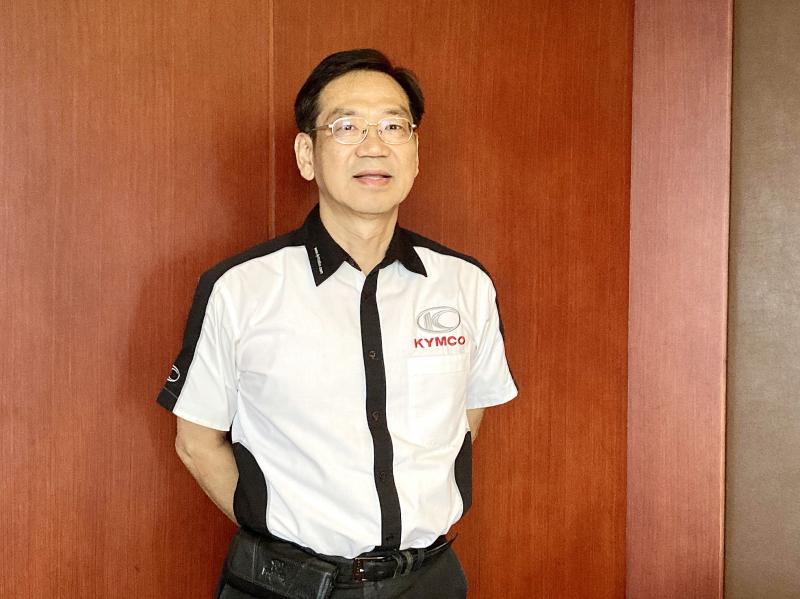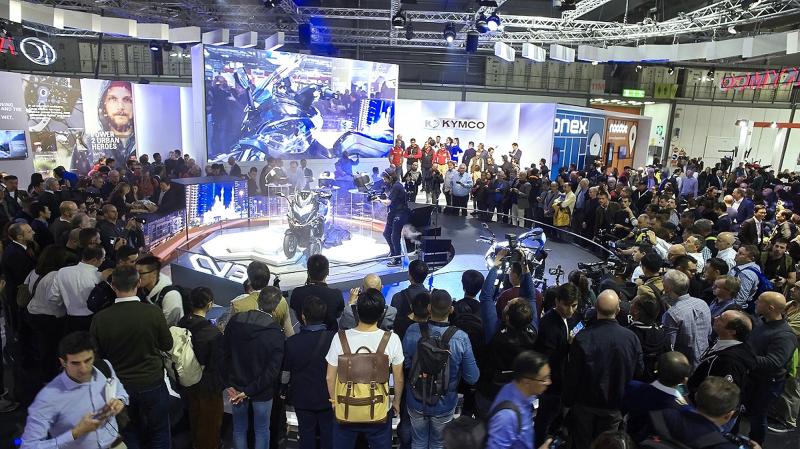Taipei Times: Did the COVID-19 pandemic reduce scooter sales in Taiwan and curtail Kwang Yang Motor Co’s (光陽工業) shipments?
Ko Chun-ping (柯俊斌): In Taiwan, the pandemic has barely affected the company’s scooter sales, thanks to the government’s better control of the pandemic. It is true that consumers at first had a wait-and-see attitude toward scooter purchases in February and March when local infections started to emerge, but the government’s quick response to rein in the spread of the virus helped calm the public’s nerves. Our sales [by unit] bounced back afterward, bringing total sales up 2 percent year-on-year in the first half of this year. Likewise, overall scooter sales in Taiwan grew 2 percent annually to 403,199 units in the first six months of the year. For the full year, we expect that scooter sales in Taiwan might be similar to last year’s number of about 900,000 units, or pick up a little bit.
TT: As progress fighting the spread of COVID-19 is uneven around the world, how has the disease affected sales of KYMCO scooters overseas?

Photo: Lisa Wang, Taipei Times
Ko: The pandemic has had a bigger impact on our sales overseas, and we have seen a year-on-year decline of 20 to 30 percent thus far. By country, the spread of the virus is still very severe in Africa and Latin America, where Brazil, Argentina and Colombia are our major markets. Because of the lockdown measures imposed by governments there, customers have temporarily paused orders as consumers are restricted from going out to shop. Besides, based on feedback from our customers, there are still some inventories that need to be digested before new orders can be placed.
Orders from European markets have recovered lately as some countries are reopening their economies gradually, as infections are under control. Currently, Spain, France and Italy are our top markets in Europe, and we are seeing orders from European markets rebound and approach normal levels. In particular, orders this month have surpassed those we received during the same month last year. Looking ahead, we are positive about the outlook for European markets as scooter distributors and shops need to buy environmentally friendly scooters in preparation for the implementation of new Euopean emission rules that are to take effect in January next year. Therefore, we expect our employees to have to start working overtime in the second half of the year, which has been the norm for us for years.
TT: How did adjustments in tax incentives and subsidies from the government change the landscape of the domestic scooter market this year?

Photo courtesy of Kwang Yang Motor Co
Ko: Electric scooter makers are heavily reliant on the central and local governments’ subsidies to sell their products due to their high price tags. Last year, strong subsidies boosted sales of electric scooters significantly from Gogoro Inc (睿能創意) and members of the Powered by Gogoro Network, such as Yamaha Motor Taiwan Co (台灣山葉). That brought electric scooter makers’ local market share to a combined 18.7 percent.
However, electric scooter sales took a nosedive in January and only accounted for about 4.5 percent of total scooter sales in Taiwan, as the central and local governments for the first time included fuel-powered scooters in the tax incentive program that subsidizes purchases of new scooters to retire old ones. Total subsidies can be up to NT$13,300 per vehicle, including tax refunds, for purchases of scooters equipped with an anti-lock braking system, or a combined braking system, as well as a rebate of 17 percent in commodity tax.
Our efforts to promote tax equity starting last year are also affecting electric scooter sales. About eight counties, or half of the nation’s local governments, supported our appeal and granted tax refunds and subsidies for purchases of fuel-powered and electric scooters, which began this year. As a result, electric scooter makers no longer enjoy preferential status.
With the new tax incentives in place for the remainder of the year, electric scooter sales could drop a bit more. Besides, Gogoro recalled some scooters due to technical problems, which has also raised the public’s concern over the electric model’s safety. Meanwhile, rapid sales growth also resulted in an insufficient supply of fully charged batteries. In my view, all these factors are likely to lead to falling electric scooters sales this year.
TT: The Ministry of Finance has proposed extending the tax refund program for five years to accelerate the phasing out of older and less environmentally friendly scooters, as the existing program is to expire at the end of this year. Do you think the ministry’s proposal is a boon for scooter makers?
Ko: Not really. It is baffling because we had not heard of this ministry proposal until recently. Furthermore, as the tax incentive program has been in place for five years, the effect is softening, as a high percentage of old scooters have been replaced. For instance, only half of KYMCO scooter buyers applied for government subsidies recently, down from 70 percent last year. Besides, it is a complicated process to get government subsidies, as applicants need to fill in at least 15 application forms from five government agencies. To us, the tax refund program is a short-term substitute before the commodity tax is eliminated. The ministry has promised to scrap the tax entirely, but no timetable has been given.
TT: Kwang Yang has been calling on the government to cancel the 17 percent commodity tax on scooters. Why is that?
Ko: From our point of view, scooters are no longer considered luxury goods, but an important mobility option for commuters — especially for lower-income earners. In most cases, commodity taxes are levied only on luxury goods such as cars. Taiwan is one of the few countries in the world that still has the extra levy on scooters, and the tax adds a financial burden on consumers, as the prices of scooters are rising due to increasing costs. The total cost of a new and greener scooter that meets the government’s latest Phase 7 emissions standards is at least two times higher than for one meeting the Phase 1 emissions standards.
To meet growing stringent emissions rules, Kwang Yang invests up to NT$2 billion [US$67.54 million] a year in research and development. Our R&D staff has risen to about 700 people. However, as one of the nation’s manufacturers, we are only asking to make a decent gross margin of 5 percent.
For the ministry, the commodity tax on scooters contributed a net NT$3 billion to the national coffers, which is a very minimal portion of the total tax revenue. The ministry has seen tax revenue surpass its forecast by more than NT$50 billion per year over the past few years. So why does it bother to continue this tax? If the ministry decides not to get rid of the commodity tax, it should at least halve the 17 percent tax rate on fuel-powered scooters to match the 8.5 percent rate on electric scooters, in our opinion.

KEEPING UP: The acquisition of a cleanroom in Taiwan would enable Micron to increase production in a market where demand continues to outpace supply, a Micron official said Micron Technology Inc has signed a letter of intent to buy a fabrication site in Taiwan from Powerchip Semiconductor Manufacturing Corp (力積電) for US$1.8 billion to expand its production of memory chips. Micron would take control of the P5 site in Miaoli County’s Tongluo Township (銅鑼) and plans to ramp up DRAM production in phases after the transaction closes in the second quarter, the company said in a statement on Saturday. The acquisition includes an existing 12 inch fab cleanroom of 27,871m2 and would further position Micron to address growing global demand for memory solutions, the company said. Micron expects the transaction to

Vincent Wei led fellow Singaporean farmers around an empty Malaysian plot, laying out plans for a greenhouse and rows of leafy vegetables. What he pitched was not just space for crops, but a lifeline for growers struggling to make ends meet in a city-state with high prices and little vacant land. The future agriculture hub is part of a joint special economic zone launched last year by the two neighbors, expected to cost US$123 million and produce 10,000 tonnes of fresh produce annually. It is attracting Singaporean farmers with promises of cheaper land, labor and energy just over the border.

US actor Matthew McConaughey has filed recordings of his image and voice with US patent authorities to protect them from unauthorized usage by artificial intelligence (AI) platforms, a representative said earlier this week. Several video clips and audio recordings were registered by the commercial arm of the Just Keep Livin’ Foundation, a non-profit created by the Oscar-winning actor and his wife, Camila, according to the US Patent and Trademark Office database. Many artists are increasingly concerned about the uncontrolled use of their image via generative AI since the rollout of ChatGPT and other AI-powered tools. Several US states have adopted

A proposed billionaires’ tax in California has ignited a political uproar in Silicon Valley, with tech titans threatening to leave the state while California Governor Gavin Newsom of the Democratic Party maneuvers to defeat a levy that he fears would lead to an exodus of wealth. A technology mecca, California has more billionaires than any other US state — a few hundred, by some estimates. About half its personal income tax revenue, a financial backbone in the nearly US$350 billion budget, comes from the top 1 percent of earners. A large healthcare union is attempting to place a proposal before